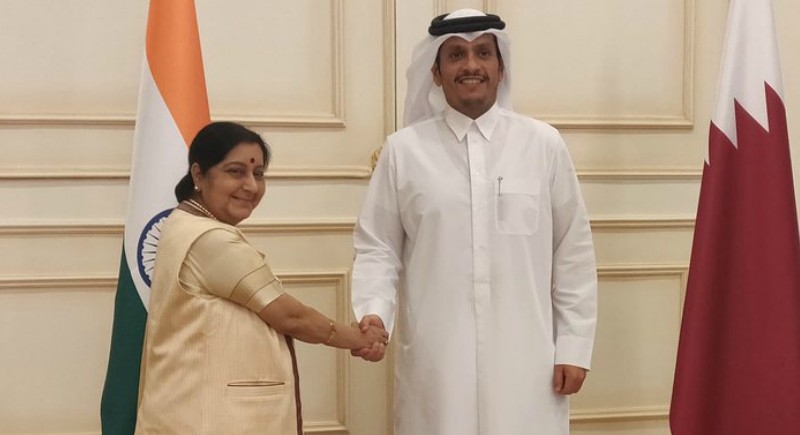Deepening ties, India and Qatar join hands forming a joint committee to enhance bilateral and diplomatic relations
Doha, October 29: Enhancing relations with Gulf nations, External Affairs Minister Sushma Swaraj’s visit to Qatar has slated a wide range of bilateral and diplomatic variation among both the countries. The two sides have discussed various spectrum pertaining to constituting constitute an inter-ministerial High Level Joint Committee to regularly review all bilateral matters, as well as regional and global issues of mutual interest.

In pursuance of the decision taken by His Highness Sheikh Tamim Bin Hamad Al-Thani, Amir of the State of Qatar and Prime Minister Narendra Modi during the visit of the latter to Doha on 4-5 June 2016 the countries have desirously enhanced and deepened the ties of fraternity and friendship between the two countries.
In order to support cooperation between the two countries in all fields in service of the common objectives of the two friendly countries. During the first ever visit of External Affairs Minister Sushma Swaraj to Doha on 28-30 October 2018, following are the bilateral confirmations by the countries.
India and Qatar have decided to establish a Joint Commission to strengthen the relations in various fields with a view to further the common interests of their two friendly peoples.
The Joint Commission will be charged with the following tasks:
1. Formulating to strengthen the relations between the two countries particularly in the economic, commercial, cultural, scientific, technological, information technology and educational fields.
2. Follow up on the implementation of the Agreements concluded between the two countries; and finding the suitable solutions for the resulting problems of the implementation thereof.
3. Facilitating the exchange of information and expertise; and encouraging bilateral consultation in service of cooperation between the two countries.
4. The Joint Commission will be co-chaired by the Ministers of External Affairs and Foreign Affairs of the two countries or their representatives; and may include in its membership representatives of the sectors concerned with the bilateral cooperation in both the countries.
5. The Joint Commission will hold a meeting at a time agreed by both countries alternately in each country. Extraordinary session may be held at the consent of both the countries.
6. The Joint Commission may, form subordinate committees or permanent or temporary joint working groups to discharge specific tasks within their mandates. These subordinate committees and joint working groups will present their recommendations to the Joint Commission for consideration.
7. The draft agenda for each meeting will be decided by consultation between the two countries through diplomatic channels in advance of the respective meeting. The draft of the agenda will be presented to the Joint Commission to endorse it at the opening session of the meeting.
8. The scope of cooperation under this Joint Declaration may be modified with mutual written consent of both the countries.